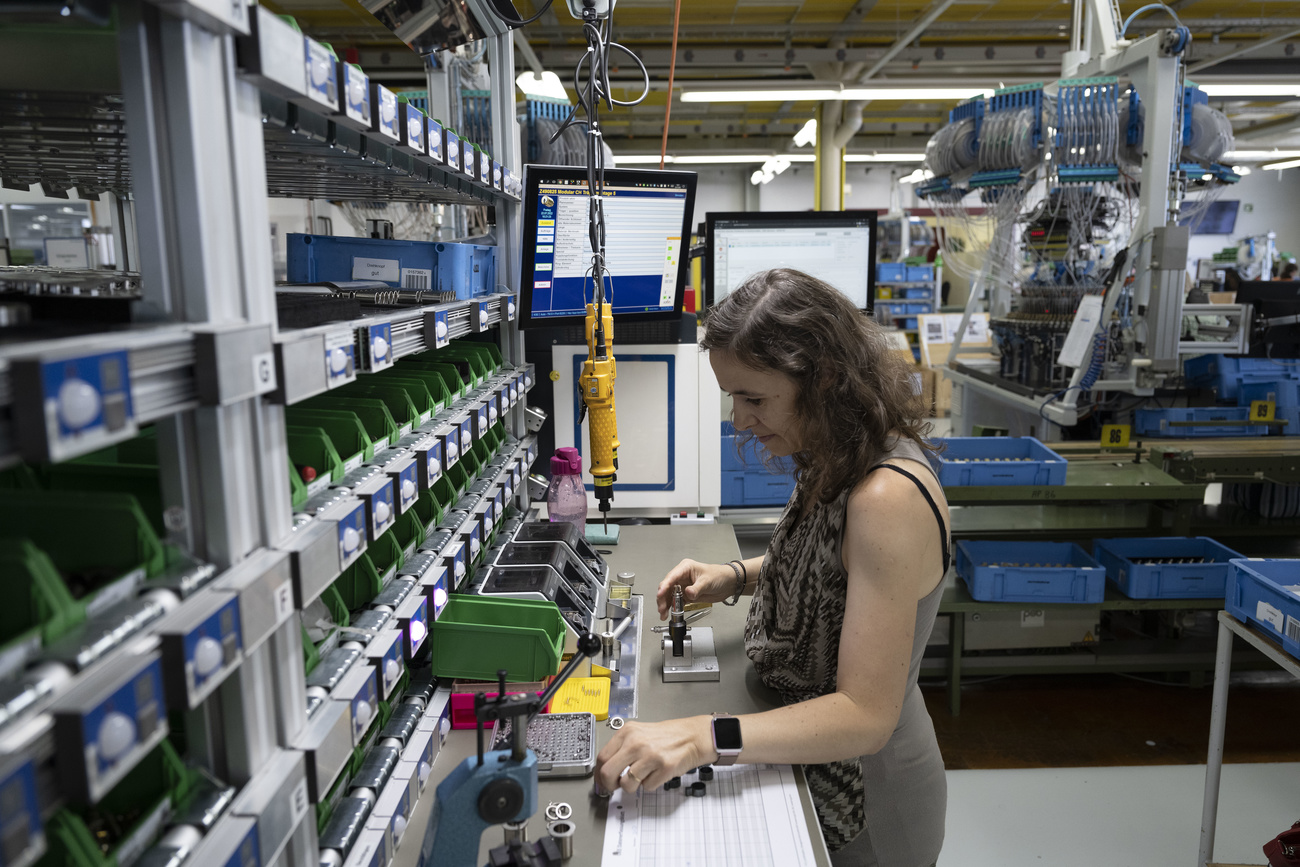
Why the strong franc no longer scares Swiss businesses

Since the creation of the single European currency in 1999, the franc has gained 60% on the euro. For years, dampening the strong franc was a key issue for export industries. But priorities have changed noticeably in recent months.
On January 15, 2015, the Swiss National Bank (SNB) sent shockwaves through the money markets and stock exchanges when it announced that it would no longer maintain the euro at CHF1.20. The central bank had adopted this measure four years earlier, when the debt crisis in the eurozone was at its height. The intention was to keep the Swiss currency from acquiring too much value, which was making Swiss products too pricey abroad.
A few minutes after the new decision was announced, the franc took off, gaining 30% on other currencies, before stabilising at CHF1.04 to a euro.
The decision drew fierce reactions from businesses. Top managers, trade unionists and industrialists adopted a common front against this “tsunami”, which was “a great danger” to jobs in the export sector and was likely to be a “fatal blow to many smaller companies”.
Seven years later, these gloomy predictions have not come to pass. Far from it: between 2015 and 2021, the contribution of Swiss industry to gross domestic product (GDP) increasedExternal link by more than one point to reach 19.4%, a rate only surpassed by Germany (at 20.8%) among the major western economies.
And here is something even more striking: while the Swiss franc keeps rising against the euro (+10% over the course of a year), hardly a single voice is being raised in Switzerland to denounce the nation’s pricey currency.
Resilient industry
“The situation now is not what it was in 2015,” explains Philippe Cordonier, director for French-speaking Switzerland at Swissmem, the umbrella organisation for the mechanical and electrical engineering industries. “At that time, the decision by the Swiss National Bank was a brutal shock, quick and unexpected. But since then, businesses have thought of things they can do to cope with the high value of the franc.”
Cutting costs, paying for components in euros, diversifying markets, developing more innovative products: the currency risk has been fully factored in by export businesses, 55% of which depend on the eurozone for their market.
There is another big difference between now and 2015. In a context of inflation, where rising prices are much more apparent in Europe than in Switzerland, Swiss-made products are again competitive on the European market. Swiss exporters can thus raise their prices more easily and counterbalance the negative effect of the currency exchange rate.
Radical rethink
It was the need to fight inflation that made the central bank raise its key rate of 50 basis points last June. This increase, the likes of which had not been seen since 2007, is another factor behind the strength of the franc against the euro. Since the beginning of the summer, the exchange rate has been heading towards less than one franc to the euro for the first time in its history.
“High inflation has transformed monetary policy worldwide,” says Stéphane MonierExternal link, chief investment officer at Lombard Odier bank. “Like most central banks, the Swiss National Bank is countering rising prices with higher interest rates. Unlike other policymakers, it has signalled a willingness to intervene to keep the Swiss franc strong, potentially reversing two decades of work to weaken its currency.”
A strong currency means being able to keep down the prices of imported goods, especially petroleum and gas, and thus control consumer prices. For the present, this policy is working for Switzerland. While inflation increased again in August (3.5%) compared to the year before, it is nothing like the levels being seen elsewhere in Europe (9.1% on average throughout the eurozone).
The central bank’s new doctrine has not met any resistance in Switzerland, even in industry or the tourism sector, whose officials were often highly critical in the past.
“We respect the independence of the national bank and its mandate,” says Cordonier. “It’s doing all it can to curb inflation.”
“Our priority right now is to make sure industry doesn’t suffer from power shortages, which would have disastrous consequences,” he adds. “In this context, the strong franc is a secondary concern, even though it remains tough for our companies to turn a profit.”
A structurally strong franc
As they benefit from the post-pandemic recovery, the mechanical and electrical engineering industries at the end of August reportedExternal link fairly encouraging results for the first half of 2022, with orders up 10.1% and sales up 12.1% compared to last year. But rising power costs and costs of raw materials as well as supply chain problems are affecting firms in the sector, which are experiencing extreme pressure on their profit margins.
Furthermore, the economic outlook for Switzerland’s neighbours is not good. In July, the European Commission loweredExternal link its growth forecasts for the eurozone to 2.6% in 2022 and 1.4% in 2023, due to the impact of the war in Ukraine.
“Without the right budgetary stimulus, the eurozone countries will be dealing with considerable economic difficulties in the coming months,” predicts Sergio Rossi, an economics professor at the University of Fribourg.
Given this situation, analysts agree that the franc will stay high against the euro in the coming months. Credit Suisse sees an exchange rate of CHF0.96 to a euro within three months, while Lombard Odier is expecting a euro-franc exchange rate of 0.93 within 12 months.
In Rossi’s view, the decline of purchasing power in the eurozone could prove to be more damaging for Swiss companies than a continuously strong franc.
“Of course, there will still be plenty of rich folks looking for luxury watches,” says Rossi. “And with its high-value-added products, the pharmaceutical industry should not do too badly either. But for all other industrial products and everyday consumer items, it’s not looking too good.”
Adapted from French by Terence MacNamee/gw

More
Swiss economy slows but stays in the black

In compliance with the JTI standards
More: SWI swissinfo.ch certified by the Journalism Trust Initiative



























You can find an overview of ongoing debates with our journalists here . Please join us!
If you want to start a conversation about a topic raised in this article or want to report factual errors, email us at english@swissinfo.ch.